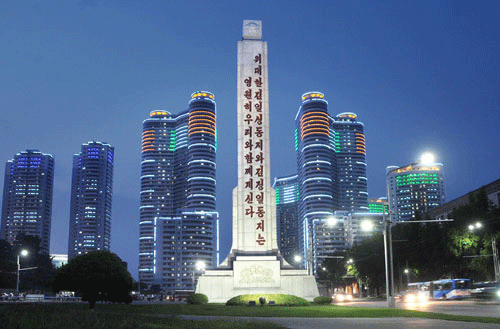 Changjeon Street Apartments in Pyongang, residence of Party cadres and other elites, illuminates the night. | Image: Rodong Sinmun |
Payment for the use of
electricity, as well as blatant discrimination in terms of supply, is causing
consternation among locals in South Pyongan Province, Daily NK has learned.
“The authorities began
to provide us with about five hours of electricity per day when the rainy
season came; but they also began to take usage charges on it,” a source in the
region told Daily NK on August 7th. “It resulted in verbal clashes between
residents and the officers dispatched by the Urban Management Office to gather
the fees.”
According to sources
inside North Korea, the summer rainy season usually brings improved electricity
provision: from 1-2hrs per day up to as much as 4-5hrs, as the country’s key
hydroelectric turbines are able to operate at a higher capacity. Consumption is
charged at a subsidized sum, approximately 80-100 KPW per month; although families
with television sets, VCRs or DVD players, fans, rice cookers, etc. pay a
surcharge of 100 KPW per device.
Though pleased with
the boost in supply, residents are resentful at calls from the revenue
collectors. The “we gave it to you, and now you should pay” approach of the
authorities is annoying for people who are accustomed to getting by without
power the majority of the time.
At the same time, electricity
supplies to enterprises and households
in North Korea often depend upon bribery; one must give to the local department
that oversees the supply in order to get more of the power. The homes of key Party
officials are themselves bribed into overlooking this with an unrestricted
supply.
Moreover, even in
periods where electricity is not going to residential homes, it is possible to
bribe the Land Management Office or local enterprises for power, but this is
something that only private businesspersons and affluent families are likely to
do. A middleman system has emerged, where residents who are able may pay third
parties to get a larger share.
The source explained
that it all means you can easily pick out the districts where Chosun Workers’
Party officials reside, as they are the ones with well-lit apartments. “The
annoyance you feel when you’ve gone through your life without much electricity
and you watch them use it late into the night is indescribable,” she said.
“We have no use for
electricity in the middle of the night, either, and find it irksome when the
lights suddenly come on,” she also added. “They don’t think about the people who are
having a hard time surviving, and while they are trading the nation’s
electricity supply, only the wealth of officials and the donjuLiterally "masters of money," donju refers to people who hav... More is growing; and only they can use it,” the source pointed
out.
And yet, “The paradox
is that without this system, the nation would probably be devoid of any kind of
electricity provision at all,” she concluded. “Transformers are on sale in the
market [at 150,000 KPW average, with larger models costing up to 1,500,000 KPW]
but even the cheapest ones are beyond the lower classes.”


















